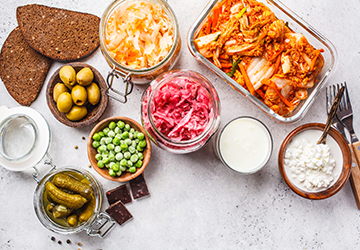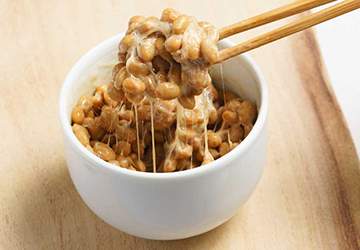The art of fermenting foods is as ancient as civilization itself. This process not only preserves and enhances flavors but also imbues foods with unique health advantages. In recent times, the benefits of fermented foods have been illuminated by modern science, drawing attention to their positive impact on overall wellness. From supporting a robust digestive system with probiotics and gut health enhancements to the joy of making homemade kimchi, kombucha, etc., fermented foods are a treasure trove of nutritional perks. Let's dive deep into this fascinating world.
The Power of Probiotics and Gut Health
The gut is often considered the body's second brain, affecting everything from our mood to our immune system. Ensuring optimal gut health is crucial, and one of the primary benefits of fermented foods is their probiotic content.
Probiotics are living microorganisms that provide numerous health benefits when consumed adequately. These beneficial bacteria enhance our gut flora, bolstering digestive health, reducing inflammation, and supporting immune function.

Popular Fermented Foods and Their Advantages
● Kimchi: A staple in Korean cuisine, kimchi is a fermented vegetable dish, often made with cabbage and a blend of spices. Making homemade kimchi allows you to enjoy its rich flavor and reap the benefits of fermented foods. Rich in probiotics, kimchi aids digestion, boosts immunity, and might even aid in weight loss.
● Kombucha: A fermented tea drink, kombucha has gained immense popularity worldwide. Making homemade kombucha is quite engaging and yields a fizzy, tangy beverage. Its advantages include detoxification, enhanced gut health, and immune system support.
● Yogurt: One of the most widely consumed fermented foods, yogurt is packed with probiotics. It's excellent for digestive and bone health and has protein content beneficial for muscle growth.
● Sauerkraut: Originating from Europe, sauerkraut is fermented cabbage. Like kimchi, it's a probiotic powerhouse and can reduce digestive disorders.
Making Homemade Kimchi, Kombucha, etc.: A Foray into Fermentation
There's a particular joy in preparing fermented foods at home. For instance, making homemade kimchi, kombucha, etc., allows you to tweak the flavor according to your preference. Similarly, brewing your kombucha gives you control over its sweetness, fizziness, and fermentation time.
Besides the satisfaction of creating something with your hands, making these at home ensures no added preservatives or unwanted chemicals. Plus, the richness of beneficial bacteria is likely higher in fresh, homemade batches.
The Larger Health Spectrum
Fermented foods don't just stop at promoting gut health. Their benefits extend to:
● Brain Health: There's a direct link between gut health and brain health. The gut-brain axis suggests a healthy gut can influence brain function and mood.
● Immunity Boost: With 70% of the immune system in the gut, enhancing gut health through fermented foods can lead to a more robust immune response.
● Nutrient Absorption: Fermented foods can increase the bioavailability of nutrients, making it easier for our body to absorb vitamins and minerals.
Lesser-Known Fermented Delights
Beyond the popular kombucha and kimchi, the world of fermentation offers a variety of lesser-known treasures:
● Tempeh: A traditional Indonesian product, tempeh is made from fermented soybeans. It's a rich source of protein, making it a favorite among vegetarians and vegans.
● Miso: A staple in Japanese cuisine, miso is a paste produced from fermented soybeans and grains. It's often used in soups and is renowned for its salty and umami flavors.
● Natto: Another Japanese specialty, natto is made from fermented soybeans and has a sticky texture. Rich in protein and vitamin K2, it's an acquired taste due to its strong flavor and aroma.

DIY Fermentation: Tips for Beginners
While making homemade kimchi, kombucha, etc., can be rewarding, beginners might face challenges. Here are some tips to ensure success:
Hygiene: Always ensure that your utensils and jars are clean. Any contamination can affect fermentation and lead to unwanted bacterial growth.
Temperature Control: Fermentation usually requires a warm environment. Make sure you store your fermenting foods in a place where the temperature is consistent.
Patience: Fermentation is only sometimes predictable. Sometimes, it might take longer than expected. Being patient and allowing the food to ferment correctly is critical.
The Environmental Benefits of Fermentation
The process of fermentation is not just good for our health but also our planet. Here's how:
● Reduced Food Waste: Many fermented foods, like kimchi, can be made using vegetable scraps, reducing the amount of waste we produce.
● Less Energy Consumption: Since fermentation acts as a natural preservative, there's less need for refrigeration or energy-intensive preservation methods.
● Natural and Sustainable: By making homemade kimchi, kombucha, etc., you're avoiding commercially produced items that might contain additives and preservatives. This benefits your health and reduces the environmental impact associated with mass production of processed foods.
Embracing the Fermentation Culture
The allure of fermented foods isn't just about health. It's about connecting with ancient traditions, understanding the intricate dance of microbes, and savoring complex and satisfying flavors. Whether you're enjoying the enthusiasm of kombucha, the spiciness of kimchi, or the tang of yogurt, you're partaking in a tradition that spans millennia.
Incorporating these foods into your diet, especially when considering making homemade kimchi, kombucha, etc., ensures that you're nourishing your body and engaging with a culinary art form that's as old as time.
Conclusion
Fermented foods offer a blend of health benefits, culinary delights, and an appreciation for ancient traditions. As we continue to rediscover the wonders of fermentation, it becomes evident that this age-old process has modern relevance — for our well-being, palate, and planet.
The world of fermentation is vast and varied. The benefits of fermented foods extend beyond just taste; they are a boon for our health, particularly when considering probiotics and gut health. So, the next time you think about making homemade kimchi, kombucha, etc., remember that you're not just preparing a meal but nurturing your gut, mind, and soul. We hope you find this guide helpful.
-
How to Brew the Perfect Cup of Artisanal Coffee?
The art of brewing coffee has evolved considerably over the years, moving from instant coffee mixes to intricate brewing processes that extract coffee beans' true essence and flavors. The rise of artisanal coffee methods highlights the brewing process's significance in determining the final cup's quality and taste. If you're a coffee enthusiast eager to master brewing the perfect cup of artisanal coffee, this article is just for you. We will delve into the core elements:
-
Top 3 Dessert Trends Dominating 2023
The world of culinary arts is an ever-evolving landscape, with new flavors, techniques, and innovations making their way to our plates each year. As we dive deep into 2023, several mouth-watering popular desserts in 2023 have stolen the limelight, leaving foodies around the globe craving more. In this article, we uncover this year's top three dessert trends, detailing the global dessert innovations and sweet treat recipes that have taken center stage.
-
How to Create a Terrarium for Your Pet Tarantula
In the realm of unconventional pet companions, tarantulas have risen to prominence as captivating creatures that inspire fascination and intrigue. Far from the ordinary, these eight-legged wonders require a habitat beyond the norm—a personalized terrarium that mirrors their natural environment while showcasing your creativity.